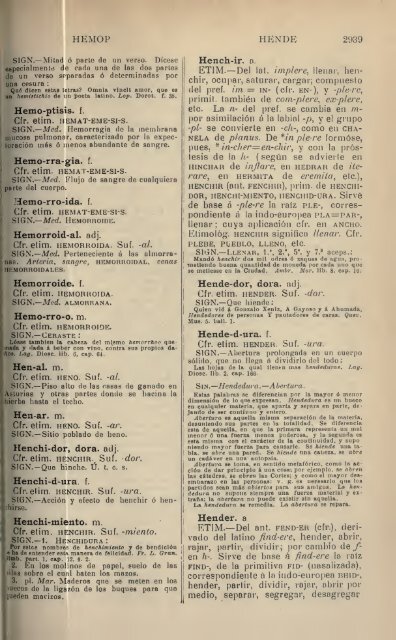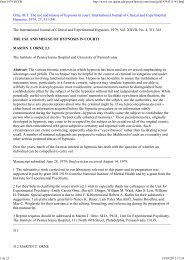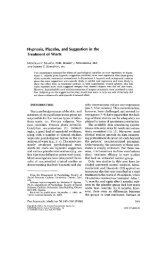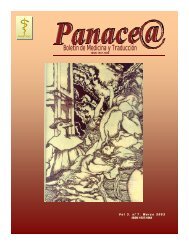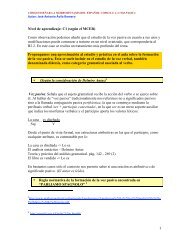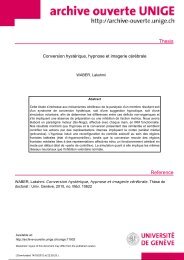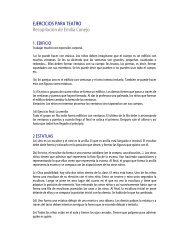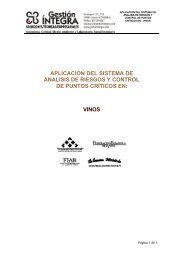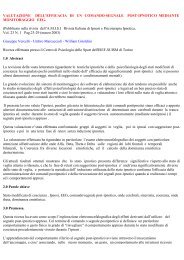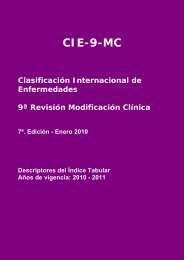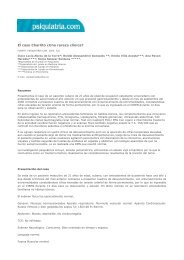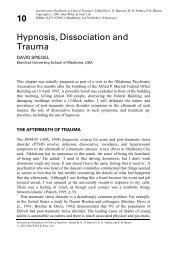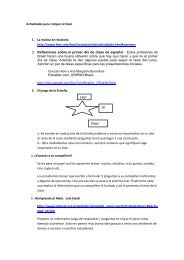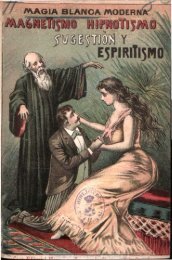Diccionario filológico-comparado de la lengua castellana
Diccionario filológico-comparado de la lengua castellana
Diccionario filológico-comparado de la lengua castellana
Create successful ePaper yourself
Turn your PDF publications into a flip-book with our unique Google optimized e-Paper software.
HEMOP HENDE 2939<br />
SIGN.— Mitad ó parte ríe un verso. Dícese<br />
especialmente <strong>de</strong> cada una <strong>de</strong> <strong>la</strong>s dos parles<br />
<strong>de</strong> un verso separadas ó <strong>de</strong>terminadas por<br />
una cesura :<br />
Qué dicen estas letras? Omnia vincit amor, que es<br />
nn hemistichio <strong>de</strong> un poeta <strong>la</strong>tino. Lop. Dorot. f. 35.<br />
Hemo-ptisis. f.<br />
Gfr. etim. hemat-eme-si-s.<br />
SIGN. Med. Hemorragia <strong>de</strong> <strong>la</strong> membrana<br />
mucosa pulmonor, caracterizada por <strong>la</strong> expectoración<br />
más ó menos abundante <strong>de</strong> sangre.<br />
Hemo-rra-g^a. f.<br />
* Cfr. elim. hemai-eme-si-s.<br />
,<br />
. parte<br />
SIGN.— Med. Flujo <strong>de</strong> sangre <strong>de</strong> cualquiera<br />
<strong>de</strong>l cuerpo.<br />
Hemo-rro-ida. f.<br />
¡: Cfr. etim. hemat-eme-si-s.<br />
SIGN.— Med. Hemorroi<strong>de</strong>.<br />
Hemorroid-al. adj.<br />
Cfr. etim. hemorroida. Suf. -al.<br />
SIGN.—Mea. Perteneciente á <strong>la</strong>s almorranas.<br />
Arteria, sangre, hemorroidal, cenas<br />
HEMORROIDALES.<br />
Hemorroi<strong>de</strong>, f.<br />
Cfr. etim. hemorroida.<br />
SIGN.— Med. almorrana.<br />
Hemo-rro-o. m.<br />
Cfr. etim. hemorroi<strong>de</strong>.<br />
SIGN.— Ceraste :<br />
f Lóase también <strong>la</strong> cabeza <strong>de</strong>l mismo hemorrhoo quemada<br />
y liada á beber con vino, contra sus propios daños.<br />
Lag. Diosc. lib. 6, cap. 64-<br />
Hen-al. m.<br />
Cfr. etim. heno. Suf. -al.<br />
SIGN.— Piso alto <strong>de</strong> <strong>la</strong>s casas <strong>de</strong> ganado en<br />
Asturias y otras partes don<strong>de</strong> se hacina <strong>la</strong><br />
hierba hasta el techo.<br />
Henar, m.<br />
Cfr. etim. heno. Suf. -ar.<br />
SIGN.— Sitio pob<strong>la</strong>do <strong>de</strong> heno.<br />
Henchi-dor, dora. adj.<br />
Cfr. etim. henchir., Suf. dor.<br />
SIGN. — Que hinche. Ú. t. c. s.<br />
Henchi-d-ura. f.<br />
Cfr. etim. henchir. Suf. -ura.<br />
SIGN.—Acción y efecto <strong>de</strong> henchir ó henchirse.<br />
Henchi-miento. m.<br />
Cfr. etim. henchir. Suf. -miento.<br />
SIGN.— 1. Henchidura :<br />
Por estes nombres <strong>de</strong> henchimiento y <strong>de</strong> bendición<br />
e ha <strong>de</strong> enten<strong>de</strong>r esta manera <strong>de</strong> felicidad. Fr. L. Gran.<br />
íimb. part. 1, cap. 12, S- 2.<br />
2. En los molinos <strong>de</strong> papel, suelo <strong>de</strong> <strong>la</strong>s<br />
li<strong>la</strong>s sobre el cual baten los mazos.<br />
3. pl. Mar. Ma<strong>de</strong>ros que se meten en los<br />
luecos <strong>de</strong> <strong>la</strong> ligazón <strong>de</strong> los buques para que<br />
lue<strong>de</strong>n macizos.<br />
Hench-ir. n.<br />
ETIM.— Del <strong>la</strong>t. implere, llenar, henchir,<br />
ocupar, saturar, cargar; compuesto<br />
<strong>de</strong>l pref. im = in- (cfr. en-), y -ple-re,<br />
primit. también <strong>de</strong> com-p/ere^ ex-plere,<br />
etc. La n- <strong>de</strong>l i)ref. se cambia en mpor<br />
asimi<strong>la</strong>ción á <strong>la</strong> <strong>la</strong>bial -p, y el grupo<br />
•pl- se convierte en -c/i-, como en chane<strong>la</strong><br />
<strong>de</strong> p<strong>la</strong>nus. De *m ple-re formóse,<br />
pues. * in-cher=en-chü\ y con <strong>la</strong> i)róstesis<br />
<strong>de</strong> <strong>la</strong> h- ( según se advierte en<br />
hinchar <strong>de</strong> inf<strong>la</strong>re, en hedrar <strong>de</strong> iterare^<br />
en HERMiTA <strong>de</strong> eremita^ etc.),<br />
henchir (ant. fenchir), prim. <strong>de</strong> henchidor,<br />
HENCHI-MIENTO, HENCHID-URA. Sirve<br />
<strong>de</strong> base á -ple-re <strong>la</strong> i'aíz ple-, correspondiente<br />
á <strong>la</strong> indo-europea p<strong>la</strong>=par-,<br />
llenar ; cuya aplicación cfr. en ancho.<br />
Etimológ. HENCHIR significa llenar. Cfr.<br />
PLEBE, PLEBLO, LLENO, etC.<br />
SIGN. Llenar, 1.', 2.", 5*. y 7.* aceps.:<br />
Mandó henchir dos mil odres ó zaques <strong>de</strong> agua, prometiendo<br />
buena quantidad <strong>de</strong> moneda por cada uno que<br />
se metiesse en <strong>la</strong> Ciudad. Ambr. Mor. lib. 8, cap. 16.<br />
Hen<strong>de</strong>-dor, dora. adj.<br />
Cfr. etim. hen<strong>de</strong>r. Suf. -dor.<br />
SIGN.— Que hien<strong>de</strong>:<br />
Quien vio á Gonzalo Xeniz, A Gayoso y á Ahumada,<br />
Hen<strong>de</strong>dores <strong>de</strong> personas Y pautadbres <strong>de</strong> caras. Quev.<br />
Mus. 5. bail. 1.<br />
Hen<strong>de</strong>-d-ura. f.<br />
Cfr. etim. hen<strong>de</strong>r. Suf. -ura.<br />
SIGN.—Abertura prolongada en un cuerpo<br />
sólido, que no llega a dividirlo <strong>de</strong>l todo:<br />
Las hojas <strong>de</strong> <strong>la</strong> qual tienen mas hen<strong>de</strong>duras. Lag.<br />
Diosc. lib. 2, cap. 166<br />
Siíi.—Hen<strong>de</strong>dura.— Abertura.<br />
Estas pa<strong>la</strong>bras se diferencian por <strong>la</strong> mayor ó menor<br />
dimensión <strong>de</strong> lo que espresan. Hen<strong>de</strong>dura es un hueco<br />
en cualquier materia, que aparta y separa en parte, <strong>de</strong>jando<br />
<strong>de</strong> ser continuo y entero.<br />
Abertura es aquel<strong>la</strong> misma separación <strong>de</strong> <strong>la</strong> materia,<br />
<strong>de</strong>suniendo sus partes en <strong>la</strong> totalidad. Se diferencia<br />
esta <strong>de</strong> aquel<strong>la</strong>, en que <strong>la</strong> primera representa un mal<br />
menor ó una fuerza menos po<strong>de</strong>rosa, y <strong>la</strong> segunda es<br />
esta misma con el carácter <strong>de</strong> <strong>la</strong> continuidad, y supo<br />
niendo mayor fuerza para causarle. Ss hien<strong>de</strong> una tabía.<br />
se abre una pared. Se hien<strong>de</strong> una cabeza, se abre<br />
un cadáver en una autopsia.<br />
Abertura se toma, en sentido metafórico, como <strong>la</strong> acción<br />
<strong>de</strong> dar principio á una cosa; por ejemplo, se abren<br />
<strong>la</strong>s cátedras, se abren <strong>la</strong>s Cortes: y como el mayor <strong>de</strong>sembarazo<br />
en <strong>la</strong>s personas: v. g. es necesario que los<br />
partidos sean más abiertos para sus aniigos. L» hen<strong>de</strong>dura<br />
no supone siempre una fuerza material y extraña;<br />
<strong>la</strong> abertura no pue<strong>de</strong> existir sin aquel<strong>la</strong>.<br />
La hen<strong>de</strong>dtira se remedia. La abertura se repara.<br />
Hen<strong>de</strong>r, a<br />
ETIM.— Del ant. fend-er (cfr.), <strong>de</strong>rivado<br />
<strong>de</strong>l <strong>la</strong>tino /ind-ere, hen<strong>de</strong>r, abrir,<br />
rajar, partii-, dividir; por cambio <strong>de</strong> /-<br />
I: en h: Sirve <strong>de</strong> base á fínd-ere <strong>la</strong> raíz<br />
find-, <strong>de</strong> <strong>la</strong> primitiva fid- (nasalizada),<br />
corresjiondiente á <strong>la</strong> indo-eurojiea bhid-,<br />
hen<strong>de</strong>r, partir, dividir, rajar, abrir |)or<br />
medio, separar, segregar, <strong>de</strong>sagregar


